| “The average Thai is much more knowledgeable about selecting a good wine in a restaurant than choosing the most important good produced in Thailand. Diners often spend thousands of baht on a bottle of wine, but don’t give a damn about the rice they eat. Rice is just seen as a commodity – and that’s not right.” Oxford-educated Thai politician Korn Chatikavanij launches a project to help Thai rice farmers sell directly to the public |
By Maxmilian Wechsler
KORN Chatikavanij served as finance minister under former Prime Minister Abhisit Vejjajiva from December 2008 to August 2011. The Oxford-educated chairman of the Democrat Party’s Policy Unit is best known for his keen political acumen and resourcefulness, but these days he’s more likely to be campaigning to improve the lot of Thailand’s farmers. In an exclusive interview with the The BigChilli, Mr Korn gave details of the Kaset Khemkhaeng (Strong Farmers) project he initiated in August 2014.
Kaset Khemkhaeng is a brilliant new initiative aimed at helping Thailand’s hard-pressed small farmers to practice sustainable farming and receive fair compensation for their rice by selling it directly to consumers – and thus bypassing the notorious middlemen and loan sharks.
Launched by last year by former banker and politician Mr Korn Chatikanaij, the project could revolutionize the way Thailand’s farmers market their rice by personalizing their produce such as ‘Khun Manit’s Rice’ denoting one particular farm. Consumers who enjoy that particular brand can then ask for it again in the future.
Kaset Khemkhaeng has already caught the imagination of restaurants, caterers and even Thai International Airways.
The project began after friends of Mr Korn met a group of housewives from the village of Nong Hin in Maha Sarakham province during an OTOP (One Tambon, One Product) event in Bangkok early last year.
“The women were farmers who, while waiting for the crop to be harvested kept busy weaving cloth to sell to supplement their income,” explains Mr Korn. “The fabric was very good quality, but they weren’t getting a good price.
“My friends, who are designers, tried to help the women. They bought cloth from them and used it for their clothing designs. The collection made a lot of money, and they funneled some of the profits back to the villagers, in addition to what they paid for the cloth,” explained Mr Korn.
“The women were very excited about this; they saw that with good design and good marketing their homemade fabrics could bring them a good income. And they began to wonder whether rice marketed in the same way could fetch a fair price to the farmers who produce it.
“As this was beyond the scope of the designer group, they approached me to see if I could help. Together, we visited Maha Sarakham and met the villagers in Nong Hin.
“We came up with the idea to package their rice in personalized designer bags made by the women weavers. On the package is the name and picture of the person who grew the rice. So the buyer feels some kind of connection to the person who grew the rice.
“The farmers in our project mill their rice and pack it themselves in the bags we design and pay the ladies to stitch them up. This provides a significant additional income – about 15 percent on top of what they are paid for the rice.
KORN Chatikavanij served as finance minister under former Prime Minister Abhisit Vejjajiva from December 2008 to August 2011. The Oxford-educated chairman of the Democrat Party’s Policy Unit is best known for his keen political acumen and resourcefulness, but these days he’s more likely to be campaigning to improve the lot of Thailand’s farmers. In an exclusive interview with the The BigChilli, Mr Korn gave details of the Kaset Khemkhaeng (Strong Farmers) project he initiated in August 2014.
Kaset Khemkhaeng is a brilliant new initiative aimed at helping Thailand’s hard-pressed small farmers to practice sustainable farming and receive fair compensation for their rice by selling it directly to consumers – and thus bypassing the notorious middlemen and loan sharks.
Launched by last year by former banker and politician Mr Korn Chatikanaij, the project could revolutionize the way Thailand’s farmers market their rice by personalizing their produce such as ‘Khun Manit’s Rice’ denoting one particular farm. Consumers who enjoy that particular brand can then ask for it again in the future.
Kaset Khemkhaeng has already caught the imagination of restaurants, caterers and even Thai International Airways.
The project began after friends of Mr Korn met a group of housewives from the village of Nong Hin in Maha Sarakham province during an OTOP (One Tambon, One Product) event in Bangkok early last year.
“The women were farmers who, while waiting for the crop to be harvested kept busy weaving cloth to sell to supplement their income,” explains Mr Korn. “The fabric was very good quality, but they weren’t getting a good price.
“My friends, who are designers, tried to help the women. They bought cloth from them and used it for their clothing designs. The collection made a lot of money, and they funneled some of the profits back to the villagers, in addition to what they paid for the cloth,” explained Mr Korn.
“The women were very excited about this; they saw that with good design and good marketing their homemade fabrics could bring them a good income. And they began to wonder whether rice marketed in the same way could fetch a fair price to the farmers who produce it.
“As this was beyond the scope of the designer group, they approached me to see if I could help. Together, we visited Maha Sarakham and met the villagers in Nong Hin.
“We came up with the idea to package their rice in personalized designer bags made by the women weavers. On the package is the name and picture of the person who grew the rice. So the buyer feels some kind of connection to the person who grew the rice.
“The farmers in our project mill their rice and pack it themselves in the bags we design and pay the ladies to stitch them up. This provides a significant additional income – about 15 percent on top of what they are paid for the rice.
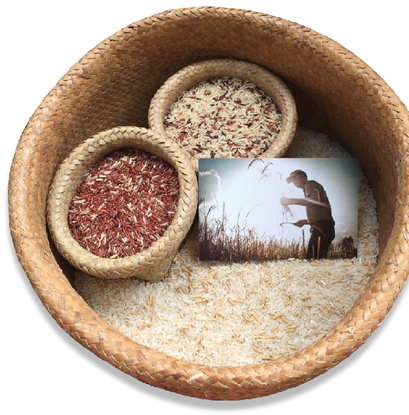
“The bags are a major selling point. Bangkok buyers love the bags and keep them.
“The rice grown in Maha Sarakham is very good quality. What is in the bag is actually a blend of different types of rice – and it’s wonderful. It’s best to let it soak in water for about ten minutes before cooking,” added Mr Korn.
The Kaset Khemkhaeng project is designed to help all of the farmers in the area. “They wanted to move away from modern methods of growing rice using chemical fertilizers and weed killers, and back to traditional methods. But they weren’t certain that they would be able to sell their crop for a good enough price and whether it would be worth the effort.
“Helping this group of farmers was very much in line with a particular policy perspective I had developed for the Policy Unit of the Democrat Party. The challenge is huge: For example, what can be done for small farmers, especially in the Northeast, who don’t have much land, who don’t have access to irrigated water and are thus dependent on rain water only, and who are heavily in debt because of increasing production costs and so on?
“We thought that the way to help farmers was to move their product up the scale to premium. The product is already very good – hom mali, the best rice in the world – but it needed to be marketed as a premium product and in a direct manner to consumers. We needed to cut out the brokers and middlemen. We also saw that the move to organic would add value in the eyes of consumers.
Mr Korn’s colleagues on this project are all personal friends, including Ms Benya Nandakwang, owner of White Café. “The Democrat Party is not involved. I keep the Party informed but this is my project. My thinking was that this should not be political. I also wanted to have the opportunity to become involved in the whole process of working with the farmers and helping them find solutions. It’s something I have always wanted to do.
“We told the farmers that we supported their thoughts about going organic, and we told them that if they did we would make sure they could sell their rice for a price they felt was fair. We agreed that this was about 23,000 baht a ton on average. That’s significantly more than they would normally be able to get, and they were very happy.
“The rice grown in Maha Sarakham is very good quality. What is in the bag is actually a blend of different types of rice – and it’s wonderful. It’s best to let it soak in water for about ten minutes before cooking,” added Mr Korn.
The Kaset Khemkhaeng project is designed to help all of the farmers in the area. “They wanted to move away from modern methods of growing rice using chemical fertilizers and weed killers, and back to traditional methods. But they weren’t certain that they would be able to sell their crop for a good enough price and whether it would be worth the effort.
“Helping this group of farmers was very much in line with a particular policy perspective I had developed for the Policy Unit of the Democrat Party. The challenge is huge: For example, what can be done for small farmers, especially in the Northeast, who don’t have much land, who don’t have access to irrigated water and are thus dependent on rain water only, and who are heavily in debt because of increasing production costs and so on?
“We thought that the way to help farmers was to move their product up the scale to premium. The product is already very good – hom mali, the best rice in the world – but it needed to be marketed as a premium product and in a direct manner to consumers. We needed to cut out the brokers and middlemen. We also saw that the move to organic would add value in the eyes of consumers.
Mr Korn’s colleagues on this project are all personal friends, including Ms Benya Nandakwang, owner of White Café. “The Democrat Party is not involved. I keep the Party informed but this is my project. My thinking was that this should not be political. I also wanted to have the opportunity to become involved in the whole process of working with the farmers and helping them find solutions. It’s something I have always wanted to do.
“We told the farmers that we supported their thoughts about going organic, and we told them that if they did we would make sure they could sell their rice for a price they felt was fair. We agreed that this was about 23,000 baht a ton on average. That’s significantly more than they would normally be able to get, and they were very happy.
| “In addition, we paid them 4,000 baht per rai up front, so they didn’t have to borrow from loan sharks at the beginning of the planting season when they buy seeds and so forth. “I got involved at every step, even sowing the seeds, so I could convincingly tell consumers that I helped to grow the rice from the start. This was an important part of the narrative of the story. “While waiting for the crop to be ready for harvesting, our team considered ways to brand the rice so it could be presented as a premium product. We came up with the brand name Imm, which means ‘to be full’ in Thai. We had a clear, coherent story and we made sure that everything was authentic. |
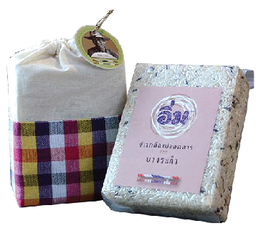
“We designed the package and worked on concepts to sell the product online and offline. Major e-commerce sites in Thailand were contacted, which proved very successful, and today the rice is sold through tarad.com and central online. We also sell to all branches of Villa supermarkets as well as on Direct TV, which is great because they help promote it.
“Because harvest season is close to the end of the year, the first sales promotion was timed to coincide with the Christmas and the New Year season. The packaging was designed to be suitable for gifts, and this was very successful too. This year we are marketing our product earlier to businesses so they can use it for corporate gifts. We are also selling it to restaurants.
“A major aim of Kaset Khemkhaeng is to make the consuming public more aware of the rice they are eating, so that they can differentiate between high quality rice and low quality rice in much the same way as people differentiate between wines.
“My pitch is to point out that the average Thai is much more knowledgeable about selecting a good wine in a restaurant than choosing the most important good produced in Thailand. Diners often spend thousands of baht on a bottle of wine, but don’t give a damn about the rice they eat. Rice is just seen as a commodity – and that’s not right.
“In fact, there are over a thousand different kinds of Thai rice of varying quality, and farmers should be paid accordingly for what they produce. This is in line with consumer trends – people are increasingly more discriminating about what they and their families put in their bodies.
“Spending power in Asia is increasing, especially in countries like China, so in the long term it makes sense to place greater emphasis on the quality of the foods we produce in Thailand. That should be our national strategy, rather than competing with every other country in selling GM (genetically modified) rice. In a way I look at this project as an experiment at the village level for a policy that can be embraced by the entire country.”
Will other villages in different provinces be enlisted to join in the project? “Not necessarily. It is going to be demand driven. I am trying to create a demand. The supply is there and we need to be sure that it remains an authentic supply. I am not in the rice trading business. I am in the business of helping rice farmers. We are doing what we can with our limited resources.
“But I do believe that we can implement this on a national level.
Thailand produces about 20 million tons of milled rice a year. Roughly speaking, we eat half of it and export half. There’s no reason why all of our exports in the future should not be high quality premier organic rice. There’s no reason why we can’t significantly increase the amount of premium organic rice consumed within the country as well.
“If we are able to succeed in doing that and farmers receive premium prices for their rice, they won’t need government support. It will also promote much more sustainable farming methods. I really think this is the way to go for Thailand, from both an economic and an environmental perspective.”
Farmers need a voice
Mr Korn stressed that his organization is not political – “at least not yet” – and described some of the other ways his group is helping farmers. “What they need – and this is the number one priority – is better access to water. They also need access to markets. But the farmers’ biggest problem is the complete lack of a negotiating position. They have no voice and no say in their future – and right now even the right to vote has been taken away from them.
“But that aside, when harvest time comes farmers have almost no real choice of who to sell their rice to. They are pretty much forced to sell to the nearest miller with no transparency in pricing. They are so much in the debt by harvest time they are forced to immediately sell their rice. They have to hire transport to get the rice to the mill. In this situation they have no bargaining power and the price is dictated to them.
“In a word, the farmers are exploited. They have no ability to control their own destiny and that’s why they continue to be poor. Therefore, we need to break up the old system. Someone has to speak for them and if I can perform that role then that’s what I must do.
“Our initial premise was that farmers can prosper if they produce the kind of quality product that appeals to middle class urbanites. Modern technology and business trends now allow farmers to sell directly to consumers and largely bypass the middlemen. They can mill their own rice and they can pack it using community facilities. We just need to facilitate them in the marketing aspect.
“That’s really where our main contribution is – helping them to establish a brand, to tell the story of their product and to promote awareness,” said Mr Korn, adding that his group recently persuaded Thai International Airways to test the rice in their kitchen, and the airline will soon be serving it on flights.
“What we are telling farmers is, if you sell directly to consumers and you have a great product, properly branded and properly marketed, you can get a premium price. But at this time farmers can’t do that by themselves. They still need help accessing markets and that’s why there’s a lot that the private sector and the government can do.
“I would like to see restaurants list different kinds of rice on their menus, or maybe even have a little menu especially for rice, with several kinds featured and a description for each. Staff could tell customers about rice varieties as well. For example, ‘This week we have wonderful rice from Maha Sarakham; next week we will feature rice from Roi Et.’ That way people will begin to learn about different kinds of rice.
“That’s telling a story and I think it begins to build awareness of the tremendous variety in Thai rice. Once people are willing to pay for higher quality the farmers will benefit, especially if consumers and retailers buy directly from the farmers as much as possible.
“I am very grateful that a British company that caters to a lot of the international schools has contacted me saying they want to buy our chemical-free rice for their schools. I also appreciate the help of The BigChilli in getting the message out,” said Mr Korn.
“Because harvest season is close to the end of the year, the first sales promotion was timed to coincide with the Christmas and the New Year season. The packaging was designed to be suitable for gifts, and this was very successful too. This year we are marketing our product earlier to businesses so they can use it for corporate gifts. We are also selling it to restaurants.
“A major aim of Kaset Khemkhaeng is to make the consuming public more aware of the rice they are eating, so that they can differentiate between high quality rice and low quality rice in much the same way as people differentiate between wines.
“My pitch is to point out that the average Thai is much more knowledgeable about selecting a good wine in a restaurant than choosing the most important good produced in Thailand. Diners often spend thousands of baht on a bottle of wine, but don’t give a damn about the rice they eat. Rice is just seen as a commodity – and that’s not right.
“In fact, there are over a thousand different kinds of Thai rice of varying quality, and farmers should be paid accordingly for what they produce. This is in line with consumer trends – people are increasingly more discriminating about what they and their families put in their bodies.
“Spending power in Asia is increasing, especially in countries like China, so in the long term it makes sense to place greater emphasis on the quality of the foods we produce in Thailand. That should be our national strategy, rather than competing with every other country in selling GM (genetically modified) rice. In a way I look at this project as an experiment at the village level for a policy that can be embraced by the entire country.”
Will other villages in different provinces be enlisted to join in the project? “Not necessarily. It is going to be demand driven. I am trying to create a demand. The supply is there and we need to be sure that it remains an authentic supply. I am not in the rice trading business. I am in the business of helping rice farmers. We are doing what we can with our limited resources.
“But I do believe that we can implement this on a national level.
Thailand produces about 20 million tons of milled rice a year. Roughly speaking, we eat half of it and export half. There’s no reason why all of our exports in the future should not be high quality premier organic rice. There’s no reason why we can’t significantly increase the amount of premium organic rice consumed within the country as well.
“If we are able to succeed in doing that and farmers receive premium prices for their rice, they won’t need government support. It will also promote much more sustainable farming methods. I really think this is the way to go for Thailand, from both an economic and an environmental perspective.”
Farmers need a voice
Mr Korn stressed that his organization is not political – “at least not yet” – and described some of the other ways his group is helping farmers. “What they need – and this is the number one priority – is better access to water. They also need access to markets. But the farmers’ biggest problem is the complete lack of a negotiating position. They have no voice and no say in their future – and right now even the right to vote has been taken away from them.
“But that aside, when harvest time comes farmers have almost no real choice of who to sell their rice to. They are pretty much forced to sell to the nearest miller with no transparency in pricing. They are so much in the debt by harvest time they are forced to immediately sell their rice. They have to hire transport to get the rice to the mill. In this situation they have no bargaining power and the price is dictated to them.
“In a word, the farmers are exploited. They have no ability to control their own destiny and that’s why they continue to be poor. Therefore, we need to break up the old system. Someone has to speak for them and if I can perform that role then that’s what I must do.
“Our initial premise was that farmers can prosper if they produce the kind of quality product that appeals to middle class urbanites. Modern technology and business trends now allow farmers to sell directly to consumers and largely bypass the middlemen. They can mill their own rice and they can pack it using community facilities. We just need to facilitate them in the marketing aspect.
“That’s really where our main contribution is – helping them to establish a brand, to tell the story of their product and to promote awareness,” said Mr Korn, adding that his group recently persuaded Thai International Airways to test the rice in their kitchen, and the airline will soon be serving it on flights.
“What we are telling farmers is, if you sell directly to consumers and you have a great product, properly branded and properly marketed, you can get a premium price. But at this time farmers can’t do that by themselves. They still need help accessing markets and that’s why there’s a lot that the private sector and the government can do.
“I would like to see restaurants list different kinds of rice on their menus, or maybe even have a little menu especially for rice, with several kinds featured and a description for each. Staff could tell customers about rice varieties as well. For example, ‘This week we have wonderful rice from Maha Sarakham; next week we will feature rice from Roi Et.’ That way people will begin to learn about different kinds of rice.
“That’s telling a story and I think it begins to build awareness of the tremendous variety in Thai rice. Once people are willing to pay for higher quality the farmers will benefit, especially if consumers and retailers buy directly from the farmers as much as possible.
“I am very grateful that a British company that caters to a lot of the international schools has contacted me saying they want to buy our chemical-free rice for their schools. I also appreciate the help of The BigChilli in getting the message out,” said Mr Korn.
Other issues
“I went to Israel in 2014 to learn about their water management methods, and also went to Phitsanulok with the Israeli ambassador, His Excellency Simon Roden, in July of this year. We visited a tapioca farm there. Tapioca is known as the poor man’s crop because it can be grown in the driest areas.
“We put in a drip irrigation system from Israel at a tapioca farm and we are monitoring the results. In a previous test we found that through a drip irrigation system farmers need 40 percent less water and yet are able to double their yields because the water is much more effectively transmitted to the roots of the plants,” Mr Korn said.
“If we can implement these systems nationwide and achieve similar results, think what an impact it would have on farmers’ incomes. We are experimenting not only with rice, but also corn and other vegetables, bananas, rice and sugar cane. We are doing this in several provinces. This introduces a much more efficient use of water and our calculations indicate that farmers can get their investment for the system back in one crop. If our experiments work, it means the system will be very empowering for farmers and we will try to implement it nationwide.”
The controversial issue of loan sharks is clearly close to Mr Korn’s heart. “Many farmers are being exploited by these people, as are other Thais from every walk of life. When I was finance minister I learned a lot about loan sharks and I went after them. One of the things we did was to implement a program that re-financed unauthorized and unlawful loans with loans from government-owned banks.
“We had 1.2 million applicants to the program. After screening we found that over half the applications were inappropriate, but we were able to help re-finance the loans of almost 500,000 individuals. I learned a lot about loan sharks in Thailand as a result,” Mr Korn said. (See article on loan sharks in January 2015 issue of The BigChilli).
“I went to Israel in 2014 to learn about their water management methods, and also went to Phitsanulok with the Israeli ambassador, His Excellency Simon Roden, in July of this year. We visited a tapioca farm there. Tapioca is known as the poor man’s crop because it can be grown in the driest areas.
“We put in a drip irrigation system from Israel at a tapioca farm and we are monitoring the results. In a previous test we found that through a drip irrigation system farmers need 40 percent less water and yet are able to double their yields because the water is much more effectively transmitted to the roots of the plants,” Mr Korn said.
“If we can implement these systems nationwide and achieve similar results, think what an impact it would have on farmers’ incomes. We are experimenting not only with rice, but also corn and other vegetables, bananas, rice and sugar cane. We are doing this in several provinces. This introduces a much more efficient use of water and our calculations indicate that farmers can get their investment for the system back in one crop. If our experiments work, it means the system will be very empowering for farmers and we will try to implement it nationwide.”
The controversial issue of loan sharks is clearly close to Mr Korn’s heart. “Many farmers are being exploited by these people, as are other Thais from every walk of life. When I was finance minister I learned a lot about loan sharks and I went after them. One of the things we did was to implement a program that re-financed unauthorized and unlawful loans with loans from government-owned banks.
“We had 1.2 million applicants to the program. After screening we found that over half the applications were inappropriate, but we were able to help re-finance the loans of almost 500,000 individuals. I learned a lot about loan sharks in Thailand as a result,” Mr Korn said. (See article on loan sharks in January 2015 issue of The BigChilli).
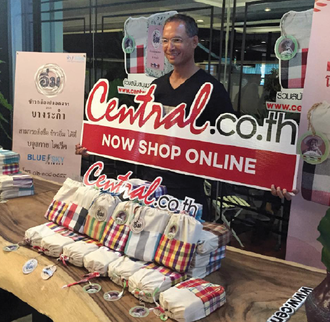
Assistant’s Account
Mr Korn’s assistant, Khun Jirayu Tulyanond, provided the following details:
“Mr Korn was born in London 51 years ago. He has a good mix of British and Thai qualities and he is a natural leader. He is an avid fan of Leeds United Football Club. High-level positions he has held include President of JF Thanakorn Securities Limited, President of J.P. Morgan (Thailand) and Chairman of the Bank for Agriculture. He joined the Democrat Party in 2004 to run for office and in 2005 was elected a Member of Parliament in Bangkok’s 2nd constituency.
“When Mr Korn’s party was in the opposition he very closely monitored the Pheu Thai government’s rice pledging scheme. If you remember, it gave 15,000 baht per ton to any farmer who produced any kind of rice. It was basically very well disguised populism.
“Needless to say, Mr Korn formed his own opinions of the best way to help rice farmers. In the current situation he’s not a Member of Parliament or in the Cabinet and he has more time on his hands, and he felt it would be interesting to observe the whole process of growing rice first hand.
“So he went to work in the fields in Maha Sarakham province, the location of the first stage of Kaset Khemkhaeng. He wanted to get his hands dirty and understand what it’s all about – the growing, toiling, harvesting, selling and finding distributors. He began to understand the mechanisms and where the weaknesses are. He wants the farmers to see a higher profit and this means cutting out the middlemen.
“We started the project in Maha Sarakham in August last year and this year began a second stage in Phitsanulok. Maha Sarakham is one of the poorest provinces in the country and that’s why we started there. The farmers have to rely on rain as they don’t have an established irrigation system yet. Phitsanulok is actually quite rich in comparison.”
Mr Korn’s assistant, Khun Jirayu Tulyanond, provided the following details:
“Mr Korn was born in London 51 years ago. He has a good mix of British and Thai qualities and he is a natural leader. He is an avid fan of Leeds United Football Club. High-level positions he has held include President of JF Thanakorn Securities Limited, President of J.P. Morgan (Thailand) and Chairman of the Bank for Agriculture. He joined the Democrat Party in 2004 to run for office and in 2005 was elected a Member of Parliament in Bangkok’s 2nd constituency.
“When Mr Korn’s party was in the opposition he very closely monitored the Pheu Thai government’s rice pledging scheme. If you remember, it gave 15,000 baht per ton to any farmer who produced any kind of rice. It was basically very well disguised populism.
“Needless to say, Mr Korn formed his own opinions of the best way to help rice farmers. In the current situation he’s not a Member of Parliament or in the Cabinet and he has more time on his hands, and he felt it would be interesting to observe the whole process of growing rice first hand.
“So he went to work in the fields in Maha Sarakham province, the location of the first stage of Kaset Khemkhaeng. He wanted to get his hands dirty and understand what it’s all about – the growing, toiling, harvesting, selling and finding distributors. He began to understand the mechanisms and where the weaknesses are. He wants the farmers to see a higher profit and this means cutting out the middlemen.
“We started the project in Maha Sarakham in August last year and this year began a second stage in Phitsanulok. Maha Sarakham is one of the poorest provinces in the country and that’s why we started there. The farmers have to rely on rain as they don’t have an established irrigation system yet. Phitsanulok is actually quite rich in comparison.”

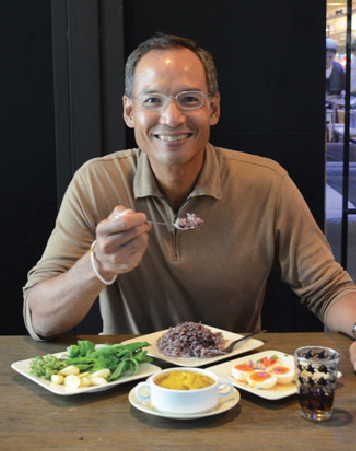
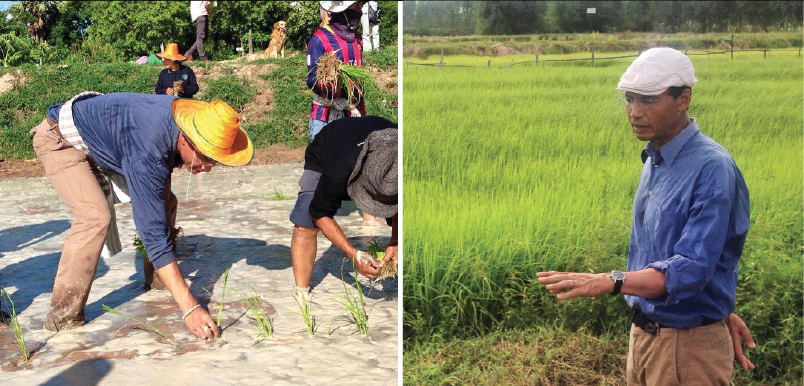
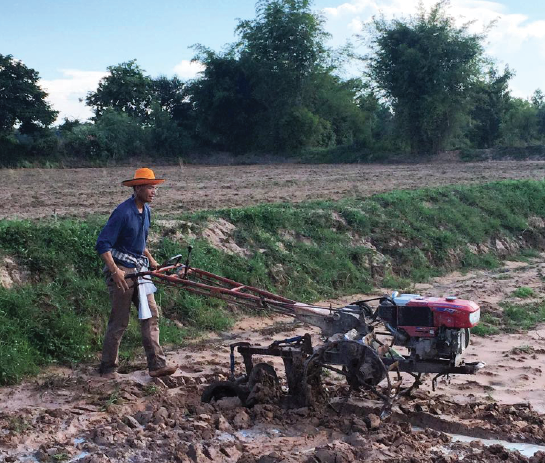
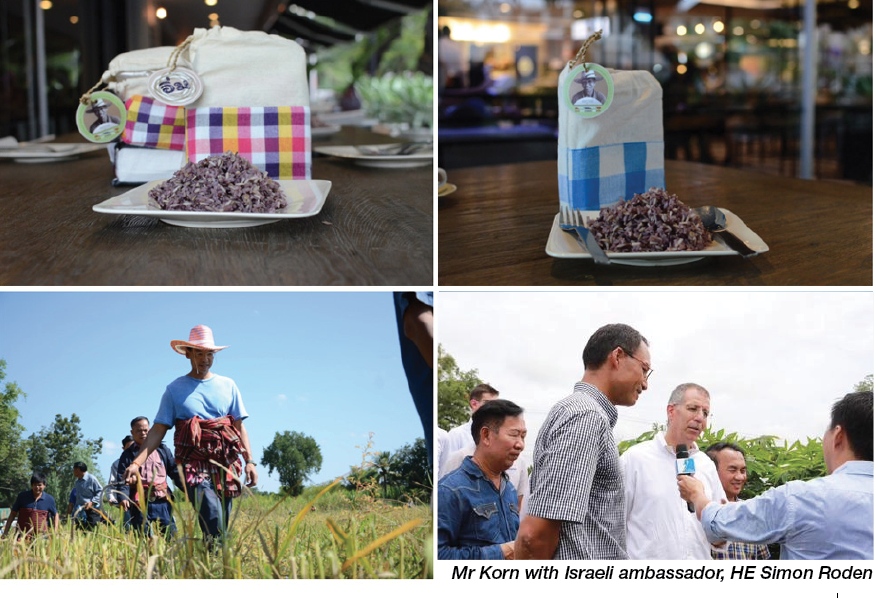
 RSS Feed
RSS Feed
















